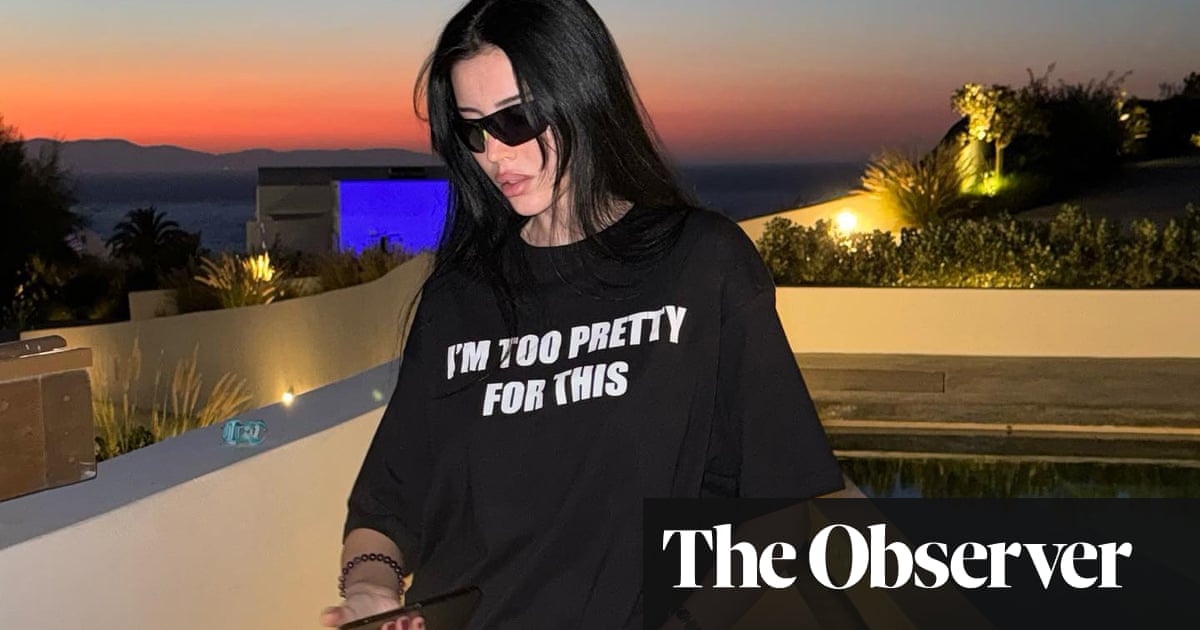
Welcome to the femosphere, the latest dark, toxic corner of the internet… for women
‘Femcel’ influencers urge their followers to give up on gender equality and use men for financial gain – in the name of feminism
Welcome to the femosphere, the latest dark, toxic corner of the internet… for women
‘Femcel’ influencers urge their followers to give up on gender equality and use men for financial gain – in the name of feminismRachael Healy
Sun 29 Dec 2024 05.00 EST

‘Dark feminine’ influencer Thewizardliz. Photograph: @Thewizardliz/Instagram
The Observer Feminism
Welcome to the femosphere, the latest dark, toxic corner of the internet… for women
‘Femcel’ influencers urge their followers to give up on gender equality and use men for financial gain – in the name of feminism
The manosphere, the misogynist internet world populated by influencers such as Andrew Tate, is widely recognised as a toxic space where young men are at risk of radicalisation. Now, say researchers, women and girls are being sucked into potentially dangerous online spaces of their own: the femosphere.
It is a term used by Dr Jilly Kay, an expert in feminist media and cultural studies at Loughborough University, in a paper published earlier this year. Kay has been researching a reactionary turn among young women, and how a backlash against mainstream feminism has created new spaces online. In the femosphere, instead of “incels” – male involuntary celibates – there are “femcels”, and instead of pickup artists there are female dating strategists and so-called “dark feminine” influencers who encourage women to find men to support them financially.
Most corners of the femosphere explicitly describe themselves as feminist, so Kay said she was surprised to see that their values seemed conservative, and their philosophy mostly anti-gender equality.
She said: “The logic that they adhere to is that men and women are fundamentally different.”
In the femosphere, as in the manosphere, there’s an overarching belief that life is about survival of the fittest, that men will always hurt women and that will never change, so strategies are needed to conquer the opposite gender.

Andrew Tate at a tribunal in Bucharest this year – the femosphere mirrors his belief that strategies are needed to conquer the opposite gender. Photograph: Vadim Ghirdă/AP
Kay looked at Female Dating Strategy, which started as a Reddit forum (with more than 250,000 members) and expanded into social media and a podcast. It has a six-point ideology for members to subscribe to, which includes ideas such as: men should always pursue women, women should seek financial contributions from men, and the majority of men have no value.
Mainstream feminism in recent decades has been “very consumer-oriented, all about individual empowerment, emphasising things like women being confident, successful, and women having all the things that men can have”, said Kay. In other words: “girlboss feminism”.
But since about 2018, Kay said, there has been a growing rejection of that idea.
Kay saw beliefs discussed and shared in online forums and via social media influencers that echoed the logic of the manosphere – particularly when it came to dating and relationships.
“Ideas like men are the gatekeeper of relationships and women are the gatekeepers of sex,” she said.
“So women’s currency in the sexual marketplace resides in her withholding sex from men, and you diminish your value if you have casual sex.”
Or the idea that, to counter women’s lesser earning power (the gender pay gap in the UK was 14.3% last year), rather than fighting for pay equality, a man should provide for a woman financially, and women must “embrace feminine energy” to secure a husband. Kay said: “It’s incredibly conservative, but it’s trying to reframe it as being this empowering strategy.”
Kay also looked at “dark feminine” influencers such as Kanika Batra and Thewizardliz. In recent years, Batra has criticised liberal feminism. In one post, she explained why she had “left feminism behind” and said: “The manosphere is incredibly loyal to everybody within it.”
In another, Batra laments the state of modern dating and the ways it has changed men and women’s roles.
“I used to be a feminist before I saw the effects of third wave feminism,” Batra said. “This has forced women into masculine roles where they are pursuing men.”
Batra added: “This is not natural, and it seems that there are more and more people not starting a family.”

‘Dark feminine’ influencer Kanika Batra has said ‘third wave feminism has forced women into masculine roles’. Photograph: Don Arnold/WireImage
Thewizardliz , meanwhile, makes videos with titles such as “How to become more beautiful”, “How to become rich”, “How to become extremely seductive”.
On the “Princess Treatment”, the influencer advises followers who want to be “spoiled” to say to their male partner: “I would appreciate it if you gave me some money, like an allowance.”
There are clear reasons why women and girls might be drawn to this thinking, said feminist theorist Dr Sophie Lewis, whose upcoming book, Enemy Feminisms will explore moments in history when feminists have aligned with unlikely groups such as colonial regimes, and even the Ku Klux Klan.
Of the femosphere’s ideas, she said: “There’s an actual offer, an actual promise that should not be sniffed at. There’s a promise to deliver women from what political economists have called the double shift.”
After liberal feminism’s vision that women could have it all, now “women are saddled with both productive and reproductive labour”, she said.
Lewis has studied some areas of the femosphere, particularly “tradwife” influencers. “The so-called trad life is genuinely seductive to women who rightly hate the endless grind,” she said. “That’s something that liberal feminism needs to recognise it hasn’t provided a solution to.”
She is discouraged by the lack of hope, and “anti-utopian” thinking in these spaces, with ideas about new ways of living often disparaged as foolish.
skip past newsletter promotion
after newsletter promotion
The femosphere promises liberation from the ‘double shift’, where liberal feminism has saddled women with both productive and reproductive labour
Kay and Lewis are not the only ones interested in this growing corner of the internet. Prof Emiliano de Cristofaro and Prof Jeremy Blackburn are two of the authors of a data-driven analysis of “toxic” women’s communities online. They had already worked on the manosphere and other “dark corners” of the internet.
They noted some of the same patterns as Kay, and found “sort of analogues of the manosphere”. Some communities even mirrored the manosphere in the advice given to members. “The narratives with respect to dating strategy are very similar – it’s a game and you try to outsmart the other gender and win,” said de Cristofaro.

Dr Jilly Kay of Loughborough University coined the term ‘femosphere’.
Some of the language used is also similar. Being “redpilled” is often discussed in the manosphere – the idea, based on the plot of the Matrix film, of suddenly being able to see reality – and “blackpilled” is used by incels to describe the idea that their situation, being, as they believe, undesirable to women, is inescapable. In the femosphere, these have been reframed as the “pink pill”.
Accusations of toxic language and hate speech have led to some female groups, including femcel groups, being banned from Reddit. Just like manosphere groups before them, they then set up independent platforms of their own.
“Usually that community reduces in size, but becomes more radicalised and more toxic, because of a lack of moderation and less exposure to more moderate positions,” said de Cristofaro.
The researchers noted that, among some femosphere members, “feminism is a key part of their identity”, but, as Kay noted, this doesn’t necessarily mean they hold progressive views. Some more traditionally feminist groups have aligned with non-feminist groups who share some of the same views – most notably, the union of Christian fundamentalists and far-right figures with some gender-critical feminists.
This is something we’ve seen throughout the history of feminism, said Lewis.
“You might almost call this anti-feminist feminism. That’s what I see in the femosphere a lot,” she said. “It’s important to understand a long lineage of women, especially middle-class white women, making a calculation that they might be able to individually find a foothold within patriarchy by accommodating themselves to a certain set of disciplines in exchange for provisional protection, while throwing other women under the bus.”
Accusations of toxic language and hate speech have led to some female groups being banned from Reddit, after which they become more radicalised and toxic
Kay sees parallels with Naomi Klein’s recent work on the digital world, where she identified that many of these new communities contain a mix of ideas from both the left and right of the political spectrum.
“In this case, certain ideas from left feminism seem to be getting mixed up with reactionary conservative ideas,” Kay said. “It’s part of broader reactionary politics, the role that digital culture is playing in rearranging traditional coordinates of left and right.”
https://www.theguardian.com/commentisfree/2024/dec/29/sex-discrimination-act-50-equal-pay
This aligns with other research, such as that of Dr Alice Evans, a senior lecturer at King’s College London, who showed earlier this year that Gen Z is extremely progressive on some issues, and extremely conservative on others, with a gulf particularly forming between young men and young women.
There’s no evidence to say that the femosphere is radicalising its members in the same way as the manosphere, which has seen members committing shocking acts of real-world violence and fuelling populist political movements.
But there are reasons to be wary. De Cristofaro said more research was needed, but “exposure to toxic content has been shown overall to increase radicalisation”.
Kay said: “It’s important that people understand it and recognise it, partly because at first glance it can seem quite appealing, especially to feminists.
“Liberal feminism has been rejected for good reason – it has failed to deliver gender equality, so it makes sense that you’d want to find an alternative. But just because something is the enemy of liberal feminism, does not necessarily mean it’s good for women.”




 A word.
A word.